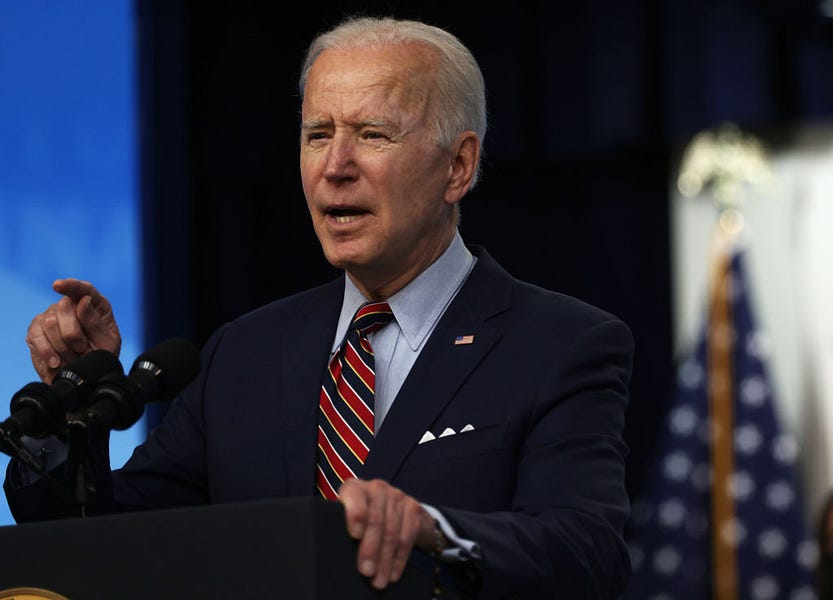Joe Biden’s first 100 days as president will be in the books Friday, and one thing is clear: Boring is a superpower.
But first, let’s start by noting that the whole “first 100 days” thing is a pseudo-event that’s only a big deal because politicians and journalists agreed to make it one, starting with Franklin D. Roosevelt. But it’s become a de facto deadline for the same crowd to talk about whether the president is off to a good start.
Not coincidentally, pollsters for NBC News asked that very question: 16 percent say Biden has had a “great start,” 28 percent call it a “good start,” 21 percent say it’s only been “fair,” and 34% percent say “poor.”
Critics want to add the “fair start” to the “poor start” to claim that he’s not doing well. Boosters want to add the “fair” respondents to the “great” and “good” columns to claim he’s knocking it out of the park. Unfortunately for both, that “fair start” crowd is probably split between those who wanted him to do more and those who wanted him to do less. That would explain why his approval rating in both the NBC poll and the Real Clear Politics average is 53 percent.
That’s good compared with Donald Trump at 42 percent and Gerald Ford at 48 percent, but historically it’s near the bottom. It’s unclear whether history is a useful yardstick. The rise in polarization and partisanship has no analog in the modern era of polling, so it shouldn’t shock us if Biden can’t compete with historic benchmarks.
Far more important, the polling is irrelevant to how historians will gauge Biden’s first 100 days. Historians measure the quantity of things done (though some historians will argue that quality is their lodestar). On that score, Biden is off to a great start.
I say that even though I disagree with much of what he has done and is trying to do. But if you just count up the amount of money spent, programs launched and executive orders issued (or rescinded), there’s been an extraordinary amount of “energy in the executive,” to borrow a phrase from Alexander Hamilton.
Which is ironic for such a “low-energy” president, as Donald Trump might say. That brings us to Biden’s superpower. He’s boring.
This is a remarkable transformation, given that for most of his career, Biden has been one of the most attention-hungry politicians in American life—a “gaffe machine,” as he has described himself. Several factors probably explain this. Maybe he’s mellowed in his old age. Having gotten the job he sought for decades, perhaps he no longer sees the point in setting his hair on fire to get attention and respect. Or he recognizes that after four years of an unpopular president alienating a majority of voters, staying above the fray of polarizing issues is the best way to cobble together a majority coalition.
But, as Jonathan Chait of New York Magazine notes, being personally boring doesn’t necessarily translate into a boring agenda. Biden is on a path to enlarge government’s role in American life—borrowing trillions to do it—in ways not seen since Lyndon B. Johnson or FDR.
It turns out that the modern liberal formula for political success, which, in Chait’s words, saw “popular mobilization as the highest form of political organization,” was a mistake. Transformative policy agendas are harder to sell when you admit that’s what you’re doing because they invite a backlash from a coalition of the opposite party and the center.
Biden has figured out, or stumbled into, a better formula: Push a fairly radical agenda while acting like grandpa. The base will be placated with the tangible results while the more moderate middle, which tends to focus on tone and personality, won’t get too worked up.
The question is whether this formula can last. Biden had Trump fatigue, desperation for COVID-19 relief and the vaccine rollout in his favor. Those issues may soon be receding in the rearview mirror.
Meanwhile, issues that divide Americans—and Biden’s base—in ways that create headaches for him are rising to the fore. Biden’s approval ratings on China (35 percent), guns (34 percent) and border security and immigration (33 percent) are signs that the road ahead will get rockier. When you’re vaccinating Americans, sending them cash and building infrastructure—particularly when Republicans are MIA or talking about Dr. Seuss—it’s easy to be inoffensive.
The Biden administration’s messaging has been successful at keeping divisive issues on the presidential back burner. Eventually, they will come to a sufficient boil and his grandpa demeanor won’t be enough. How he responds will be a better measure of his presidency than his first 100 days.







Please note that we at The Dispatch hold ourselves, our work, and our commenters to a higher standard than other places on the internet. We welcome comments that foster genuine debate or discussion—including comments critical of us or our work—but responses that include ad hominem attacks on fellow Dispatch members or are intended to stoke fear and anger may be moderated.
You are currently using a limited time guest pass and do not have access to commenting. Consider subscribing to join the conversation.
With your membership, you only have the ability to comment on The Morning Dispatch articles. Consider upgrading to join the conversation everywhere.